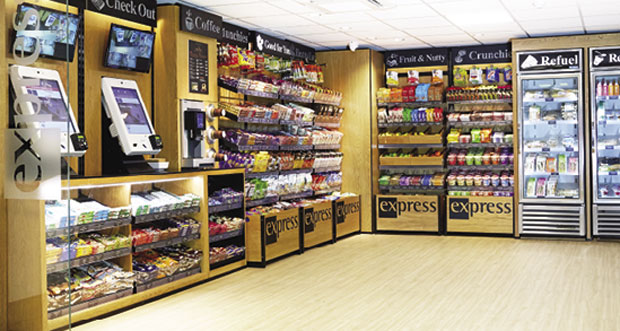Paul Hearne, Executive Director, Express Vending on how, with the help of the latest vending technologies, FMs can provide automated COVID-compliant catering in the workplace
Despite many workers continuing to work from home, there are, of course, those who are based, at least some of the time in the workplace, meaning catering options still need to be provided. In sometimes half empty buildings, how can catering facilities stay COVID-19 compliant while remaining convenient and accessible?
Vending solutions are a useful way of complying with the pandemic’s hygiene restrictions, as they offer added value in terms of social distancing. Not only do they not require staff to man them, but food options are hygienically sealed, giving staff some additional protection. Technology developments have also meant some machines will accept payments via digital assets like apps, which means people only need to touch the vending machine once to make their purchase.
EFFECTIVE CONTROLS
We made it clear from the start that our on-site visits would be slightly different to maintain social distancing measures with the focus to ensure the safety and wellbeing of our customers and our staff.
Vending and catering suppliers must always work within the guidelines set out by Government and local authorities and send out relevant COVID-19 marketing and pre-delivery inspection and installation information before team visits. It’s essential to prepare staff for onsite visits, while prioritising critical control points to eliminate or reduce hazards to an acceptable level.
For example, internal audit programmes should be reviewed to ensure the focus is on processes most at risk because of changes introduced in response to COVID-19. This includes a greater emphasis on hygiene and more attention paid to cleaning surfaces and hand sanitisation during site installation; with the inclusion of wearing the necessary PPE when entering sites.
If it’s necessary for FMs to use an emergency alternative supplier, check existing certifications, audit reports and request product samples to ensure requirements are met. It’s also important to check if any new allergens are present with any new supplies and if the product shelf life is impacted.
Remember, access to customer sites will need to be reviewed and may be restricted, so it’s essential to check any new site rules for visitors are provided in advance. A big focus for managers should be communicating the new post-COVID risk assessments and controls effectively and checking all measures are being complied with across the building.
When it comes to facilitating a safe working environment, the simplest measures can be the most effective:
- Where possible, we split employees into teams and staggered shift patterns to minimise the number of people working at one time and limit the risk of infection in our own premises.
- We also created additional protection via social distancing markers or stickers which we used on site and included as part of our updated HUB offerings to clients.
- Fitting catering areas with additional measures, like Perspex screens and socially distanced floor markers, offers reminders to users about distancing guidelines and encourages adherence.
Plus, where contact is unavoidable – for example, opening and closing fridges – contact-free hand sanitising stations offer a sought-after layer of security. This can be achieved through additional training on risk awareness specific to the controls for COVID-19 front-line working and around the use and wearing of additional PPE, such as masks and gloves, where they are required.
In many ways, challenging situations mean risk assessments are sometimes more thorough, and further reduces the chances of issues later down the line. One of our greatest successes in risk assessment was empowering our staff to carry out dynamic assessments at each location they visited and supporting them to walk away if they did not feel the area had the correct restrictions in place.
ENHANCED AND LONG-TERM CATERING SOLUTIONS
While COVID-19 restrictions continue to be in place, vending solutions, such as Micro Markets and workplace catering have been adapted to ensure alternative options can be offered with improved health and safety features.
For example, Express Vending installed a vending HUB at Collins’ Aerospace, just as COVID-19 restrictions were starting to take place. Collins Aerospace had temporarily stopped its shift patterns during COVID-19 and put its night shift workers on a day shift, so the HUB was a much-needed solution in providing staff with sustenance during the pandemic and beyond. The new HUBs came with hand sanitising stations for both entry and exit points and two-metre stickers were added to make the area COVID-19 compliant.
Additional signage and guidance on distancing and handwashing was also provided, along with suggested control over numbers in the specific area.
CONTACT-FREE SOLUTIONS
As organisations upgrade solutions to be COVID-compliant, one of the priorities is ensuring as many touch points are removed from sites as possible. Touch-free coffee machines reduce the risk of spreading bacteria and viruses such as COVID-19, without the need to compromise on your site’s hot drinks facilities. This is why there is now the option of coffee machines that use Distance Selection technology. This new technology allows individuals to select a drink by hovering their finger over the selection screen, from a distance of up to two centimetres.
We also added a HUB Beacon App, to our customer catering options. As well as contactless payment options via the kiosk, this app allows staff to scan items and pay on their smart device, eliminating unnecessary touch points. Another health and safety feature on Micro Market fridges is where, if food is out of date, it automatically locks, so you do not have the risk of staff eating out of date food, especially relevant in the current situation where throughput is erratic.
Looking past the current crisis and the future of the workplace, I believe some of the changes made due to COVID-19 restrictions may be more long-term, with a deeper appreciation of the convenience and safety of pre-packaged food and drink for staff.





